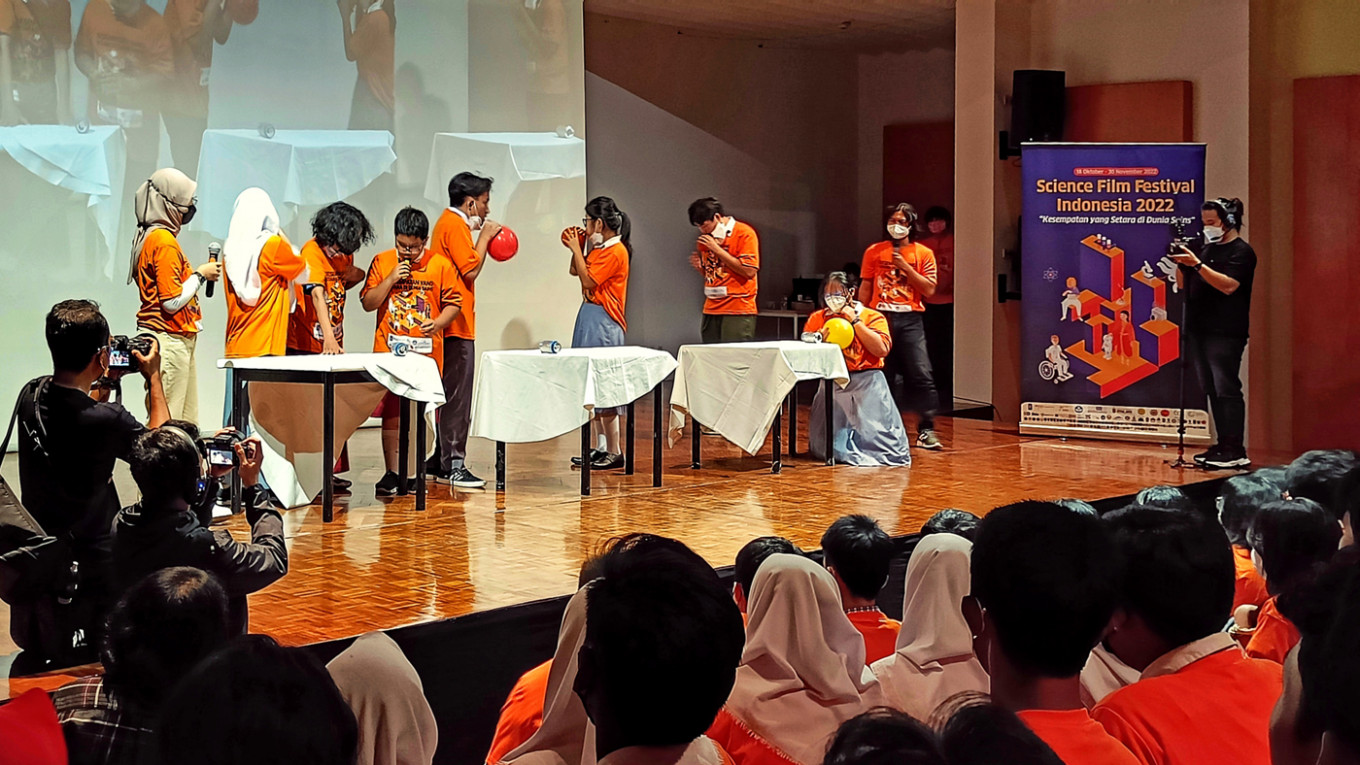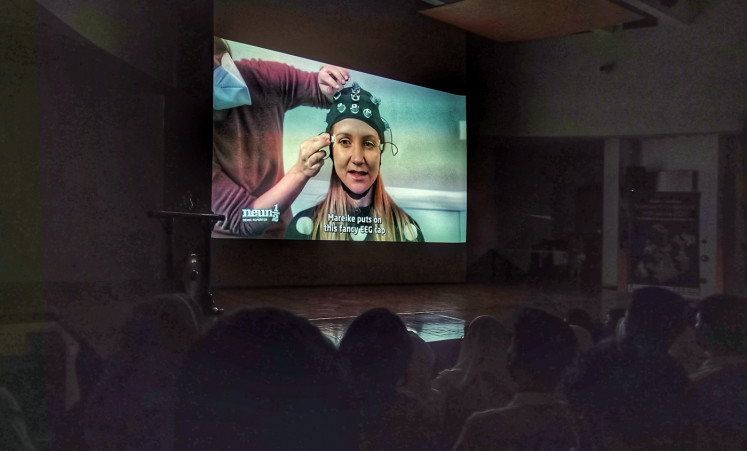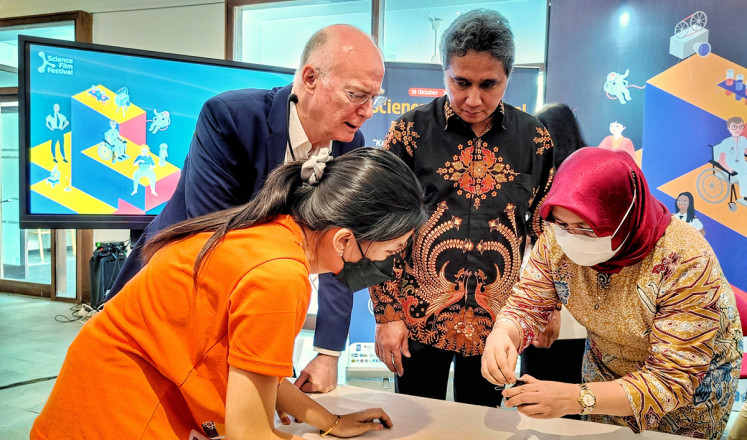Popular Reads
Top Results
Can't find what you're looking for?
View all search resultsPopular Reads
Top Results
Can't find what you're looking for?
View all search resultsScience Film Festival 2022 promotes equal opportunities in science
The Goethe-Institut is screening 17 science films from 10 countries in 55 cities in Indonesia during Science Film Festival 2022.
Change text size
Gift Premium Articles
to Anyone
Goethe-Institut screens 17 science films from 10 countries in 55 cities in Indonesia during Science Film Festival 2022.
Science. Some students love it, while others hate it. And yet, science is crucial as it has made our lives much easier and better. Thus, it is necessary to foster interest among young people to learn and master it to create a better world.
The German cultural center the Goethe-Institut holds the international Science Film Festival (SFF) to encourage children to study and explore science. In the annual program, several science movies are selected by a group of judges to be screened to students in elementary, junior high and senior high schools. These film screenings are also accompanied by scientific experiments relating to the movies.
Today, the program, first initiated in Thailand in 2005, has expanded to 23 countries in Africa, the Middle East and South and Southeast Asia, including Indonesia.
The program started in Indonesia in 2010, with film screenings in approximately 20 cities across the archipelago.
Over the years, the film festival has grown. This year's festival, which opened in Goethe-Institut Jakarta on Oct. 18, will present film screenings in over 100 schools, science centers and communities in 55 cities across Indonesia.
"The Science Film Festival in Indonesia brings in a selection of 17 inspiring international films from 10 countries," Stefan Dreyer, regional director of Goethe-Institut Southeast Asia, Australia and New Zealand, said during the press conference. "And these films will be accompanied by 13 [scientific] demonstrations or experiments to explain a little bit more in detail what the films are all about."
This year's festival is also supported by the Indonesian Education, Culture, Research and Technology Ministry, the Embassy of the Federal Republic of Germany, the initiative Schools: Partners for the Future (PASCH), Bildungskooperation Deutsch (BKD), Rolls-Royce, as well as Paramadina University, Atma Jaya Catholic University and Jakarta State University (UNJ).
Movie screening: An excerpt of the film 'Nine-and-a-Half - Your Reporters: Unimaginable! What Thoughts Can Move’ (2021), in which Jana, the reporter, experiments with an EEG cap to move things without touching them. (JP/Sylviana Hamdani) (JP/Sylviana Hamdani)Film selections
Five Indonesian judges, consisting of a journalist, scholar and elementary school, junior high school and high school students from different cities in the country, have handpicked 17 movies out of the total of 91 selections for the festival this year.
Hilmar Farid, education ministry director general, praised the film selections for this year's festival.
"I'm thrilled that the judges [that selected the movies] also include elementary, junior high, and high school students," Hilmar said. "And the films they've selected are also very relevant with the problems that we're currently facing, such as garbage, the elevation of sea surface levels [and] climate change, viewed from the science perspective."
Among the 17 films screened in the festival this year are seven from Germany and three from Southeast Asia, including Indonesia.
All these movies have been dubbed in Indonesian so that children can understand them better.
The film festival opened with the screening of the German movie Nine-and-a-Half - Your Reporters: Unimaginable! What Thoughts Can Move (2021) The film portrays a young reporter named Jana, experimenting with EEG Cap and Exoskeleton Arm, which allow her to move things without touching them.
The opening day culminated with both the speakers in the press conference and the students attending the event conducting a simple science experiment in which they had to move objects without touching them.
While the speakers attempted to move a cylinder with magnets, the students participating in the science experiment tried to move a can by using balloons.
"We want science to be fun," Dreyer said. "We want it to be interesting to young minds."
The Indonesian movie in the selection is interesting, too. Titled Let's Make a Difference! - SMA Ignatius Global School Palembang, the four-minute movie features the schoolchildren of Ignatius Global High School in Palembang encouraging friends and people in their immediate surroundings to minimize plastic waste.
Another movie that touches on plastic waste is the 19-minute movie from Austria. Titled Plastic Age - Forever? (2021), the movie catapults us to the year 2500, when scientists try to clear microplastic fibers from the earth's soil to make it fertile again.
Equal opportunities for all
As is customary, the festival carries a theme relevant to today's situation each year. The theme of this year's festival is Equal Opportunities in Science. With the music, the festival hopes to encourage fairness in science, in which everyone, regardless of race, gender, religion and other personal backgrounds, is treated equally and possesses equal opportunities in pursuing science in education and their careers.
"In the context and aftermath of the pandemic, diversity and inclusiveness matter more than ever," Dreyer explained. "The Science Film Festival represents our commitment to making these issues visible, to show that studying and working in science is open to all and for the benefit of all sections of society."
The education ministry directorate general agreed.
"This issue of equality is critical these days," Hilmar Farid said. "We all know that the perception that science belongs to certain groups of students persists in Indonesia."
Hilmar then revealed that it was still common to encourage students from low socioeconomic backgrounds to pursue a vocational education instead of science so they could find jobs sooner.
"The festival's theme this year highlights a problem deeply rooted in our society," he said.
Many families in Indonesia still discourage their daughters from taking higher education, especially in scientific fields, as they are considered future wives and mothers who will only take care of their husbands and children.
There is also a perception that children living in remote areas should refrain from learning science and choose vocational studies instead. Vocational skills, such as cooking, tailoring and car repair, are deemed to be immediately applicable to their daily life and will help them find jobs.
"Thus, I especially commend the fact that the festival is held in 55 cities across Indonesia, some of them are cities that I've never visited," Hilmar said. "In this way, the festival, in line with its theme, gives equal opportunities to those living in remote areas access to educational content [in the films]."
The films will be screened offline at schools in Greater Jakarta, Bandung, Medan and Sidoarjo (East Java).
Meanwhile, in cities other than those mentioned above, such as Aceh, Bintuni and Fakfak (West Papua), Bombana (Southeast Sulawesi), Humbang Hasundutan (North Sumatra), Waikabubak (East Nusa Tenggara) and many other cities, the film screenings will take place via Zoom.
"We'll also host the science experiments for students living in these cities via Zoom," said Elizabeth Soegiharto, Goethe-Institut Indonesian program coordinator and SFF Indonesia manager.
This year's festival also marks the 70th anniversary of diplomatic relations between Indonesia and Germany.
"Diversity in science education, I think, is a question of fairness, but also a question of reason to push for this," Christoph Fischer, head of culture and information of the Federal Republic of Germany in Indonesia, said.
"Fairness, because, quite logically, [science education] should not be determined by your background, your belief, gender or what way you choose in life," Fischer added. "It's also a question of reason because research shows that education systems that are more diverse [and] more open perform better and manage to create excellence in science."
"And if you look at the great challenges that we're facing currently, we need excellence in science to find solutions," he concluded.
Try it on: Stefan Dreyer (second left), Hilmar Farid (second right) and Fatchiah E. Kertamuda (right) engage in a science experiment on the opening day of Science Film Festival. (JP/Sylviana Hamdani) (JP/Sylviana Hamdani)Wooing the audio-visual generation
Hilmar believes that these film screenings will be an effective way to encourage today's "audio-visual generation" to love science.
"The time that kids spend consuming audio-visual content on social media has reached an alarming level of 4-5 hours each day," he said. "And most of the content [on social media] is non-educational."
"The way to counter [the impacts of negative audio-visual content] is not by forbidding them, as the kids will have 1,001 ways to access them," Hilmar said. "A more effective way is by providing educational content in the way they like."
One-minute trailers of all the movies to be screened on SFF 2022 are available on the festival's official Instagram account @sciencefilmfest.
SFF is also organizing film viewings for the public in science centers in Jakarta, Bandung, Yogyakarta and Pontianak.
In Jakarta, the public film screenings are scheduled to be held at the Indonesia Science Center in Taman Mini Indonesia Indah (TMII) from Nov.1 to 30. Contact the admin at the official Instagram account for more information about the schedule.













